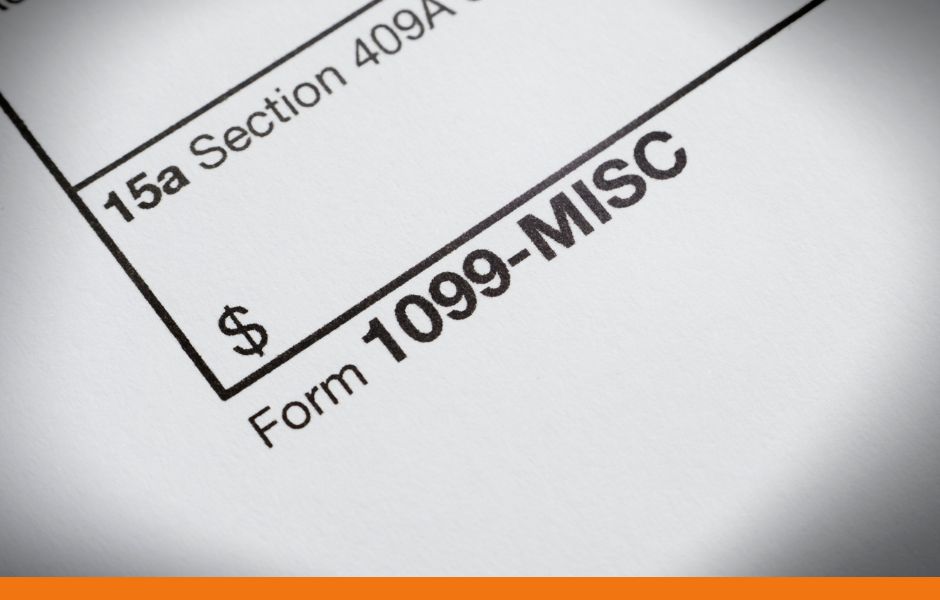
Image source: Canva Pro
What is the 1099 Form?
The 1099 Form is a series of tax forms used to report various types of income that are not covered under traditional employee wages (i.e., those reported on a W-2 form). It is typically issued to independent contractors, freelancers, self-employed individuals, and others who receive income outside of a formal employer-employee relationship. The form is also used to report other income types, such as interest, dividends, rental income, and more. The issuer of the 1099 (the person or business that paid the income) sends one copy to the recipient and another to the Internal Revenue Service (IRS). The recipient uses the form to report income on their tax return.Types of 1099 Forms
There are several types of 1099 forms, each designated for specific types of income. Here are the most common ones:- 1099-NEC: For reporting Nonemployee Compensation (used by independent contractors and freelancers).
- 1099-MISC: For various types of miscellaneous income, such as rental income, prizes, and awards.
- 1099-INT: For reporting interest income earned from banks, financial institutions, or savings accounts.
- 1099-DIV: For reporting dividends earned from investments in stocks and mutual funds.
- 1099-G: For reporting unemployment compensation or state tax refunds.
- 1099-R: For reporting distributions from pensions, annuities, retirement plans, and IRAs.
- 1099-K: For reporting payments from third-party settlement organizations, such as PayPal or Venmo, when certain thresholds are met.
Key Sections of a 1099 Form
- Payer Information: Name and Taxpayer Identification Number (TIN) of the person or business that issued the payment.
- Recipient Information: Name and Social Security Number (SSN) or Employer Identification Number (EIN) of the person receiving the income.
- Payment Details: Specific amount of income received by the taxpayer, often listed in different boxes depending on the income type.
- Federal and State Withholding: Any taxes withheld, if applicable.
Frequently Asked Questions: 1099 Form
Who Receives a 1099 Form?
You’ll receive a 1099 form if you were paid $600 or more during the tax year as an independent contractor, freelancer, or non-employee, or if you earned certain types of income like interest or dividends. Businesses and organizations that made these payments issue the form.
What Is the Difference Between a 1099 and W-2?
A W-2 is used to report wages earned by employees, with taxes withheld, while a 1099 is used to report income paid to independent contractors or other non-employees, where no taxes are typically withheld. You are responsible for paying taxes on your 1099 income.
When Is the Deadline to Send and Receive 1099 Forms?
Businesses must send 1099 forms to recipients by January 31st of the following year. They must also file the form with the IRS by the same deadline. Recipients should receive them by early February.
What Should I Do if I Don’t Receive a 1099 Form?
Even if you don’t receive a 1099, you are still responsible for reporting any income you earned on your tax return. Contact the issuer if you were expecting a 1099 and didn’t receive one. However, you should still report the income based on your records.
What Happens if I Don’t Report 1099 Income?
Failing to report 1099 income can result in penalties, interest, and potentially an audit by the IRS. The IRS receives a copy of the form from the issuer and can match it with your return, so it’s essential to accurately report all income.
How Do I Report 1099 Income on My Tax Return?
Report your 1099 income on your Form 1040. For non-employee compensation, this usually goes on Schedule C, which is used to report business income and expenses. For interest or dividends, you’ll report it in the respective sections of the 1040.
Can I Deduct Expenses From My 1099 Income?
Yes, if you’re an independent contractor or freelancer, you can often deduct business-related expenses such as supplies, travel costs, and equipment. These deductions are reported on Schedule C of your tax return and can reduce your taxable income.
How Is 1099 Income Taxed?
1099 income is subject to self-employment tax (Social Security and Medicare) as well as federal and state income tax. Since no taxes are typically withheld on 1099 income, you may need to make estimated tax payments throughout the year.
- Glossary
- Glossary: 401k ContributionsContributing in a 401k plan is among the most efficient strategies for ensuring a reliable financial future post-retirement. It aids workers in setting aside funds for their later years and also offers substantial tax advantages.







